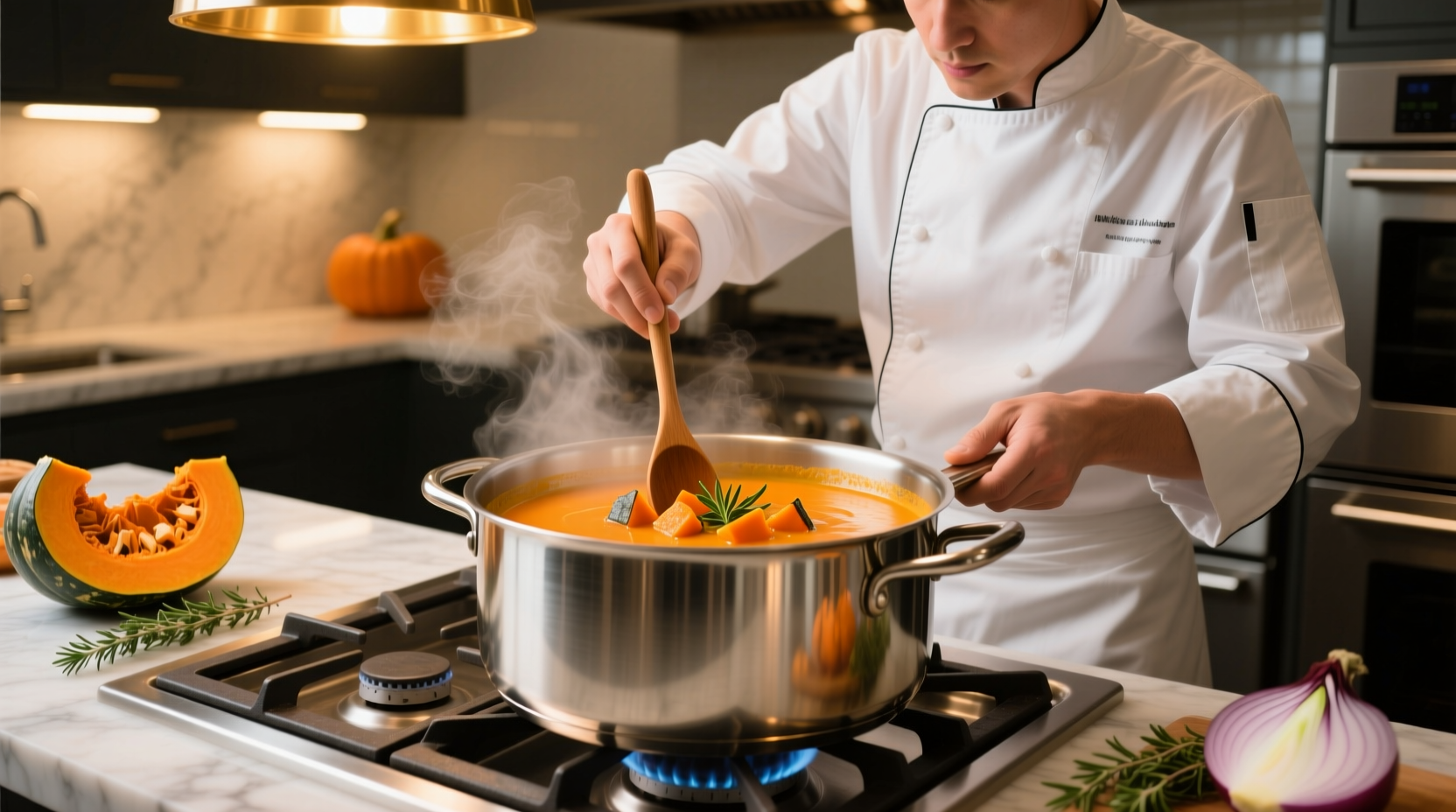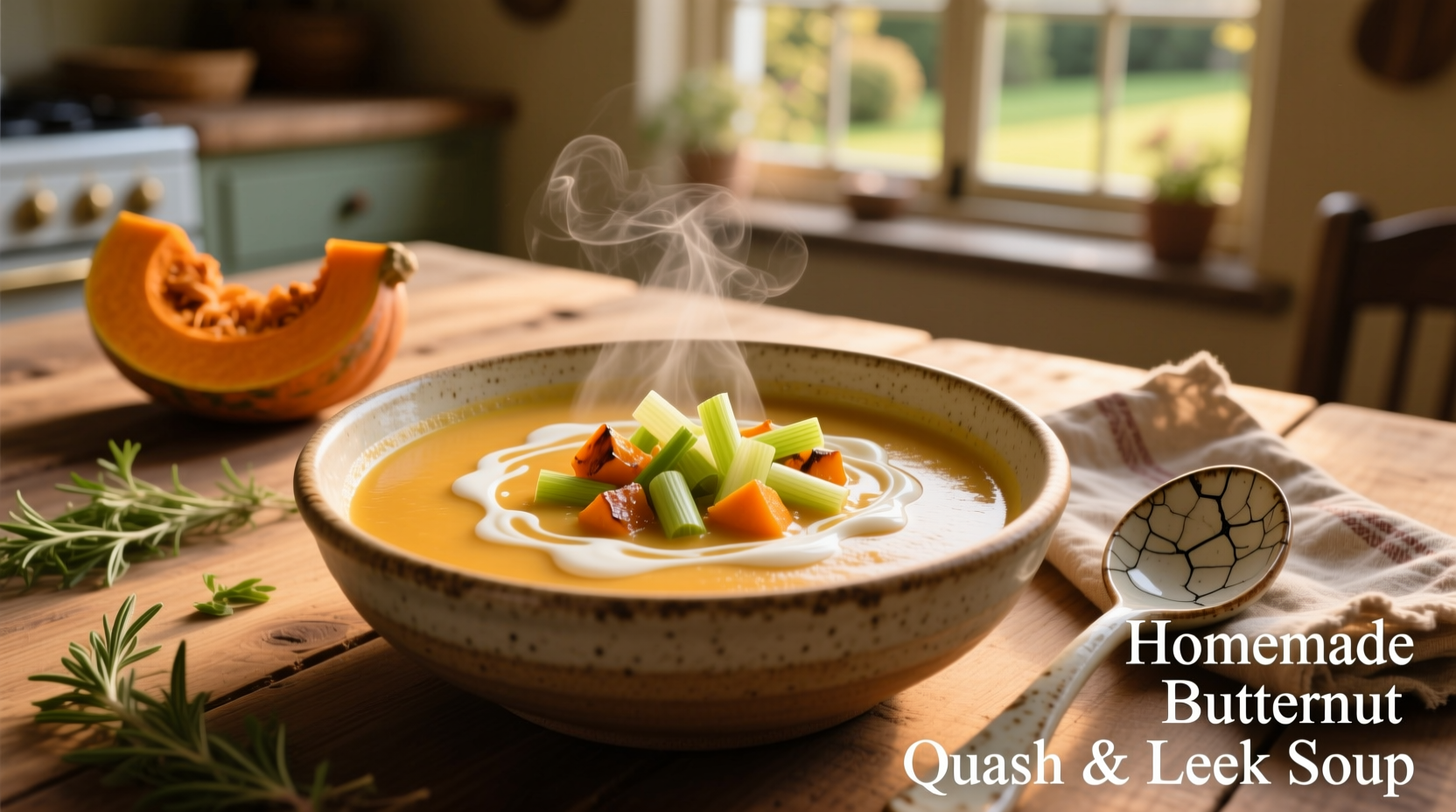There's a reason butternut squash and leek soup appears on menus from Parisian bistros to New York farm-to-table restaurants: this elegant combination creates a naturally sweet, earthy flavor profile that satisfies without overwhelming richness. As a French-trained chef specializing in European culinary traditions, I've perfected this recipe through years of testing different preparation methods and ingredient ratios.
Why This Flavor Combination Works
Butternut squash and leeks form a culinary partnership that transcends seasonal cooking. The natural sweetness of butternut squash (Cucurbita moschata) perfectly balances the mild onion flavor of leeks (Allium ampeloprasum var. porrum), creating a harmonious base that requires minimal enhancement. According to research published in the Journal of Food Science, the Maillard reaction that occurs when properly caramelizing leeks releases complex flavor compounds that enhance the squash's natural sugars without added sweeteners.
| Ingredient | Flavor Contribution | Optimal Preparation |
|---|---|---|
| Butternut squash | Natural sweetness, earthy notes | Roast at 400°F (200°C) for 25 minutes |
| Leeks | Mild onion flavor, subtle sweetness | Sweat slowly in butter until translucent |
| Vegetable stock | Umami foundation | Homemade preferred, low-sodium store-bought acceptable |
Selecting Quality Ingredients
The foundation of exceptional butternut squash and leek soup begins with ingredient selection. Choose squash that feels heavy for its size with a uniform beige color and minimal blemishes. The USDA recommends selecting squash with a hard rind that produces a hollow sound when tapped. For leeks, look for crisp, bright green tops and firm white bases without yellowing. The USDA Agricultural Research Service confirms that peak-season butternut squash contains 457% of your daily vitamin A requirement per cup, making this soup both delicious and nutritionally dense.

Essential Equipment Checklist
- Sharp chef's knife (8-10 inches)
- Sturdy cutting board (preferably wood or composite)
- 4-6 quart heavy-bottomed pot (Dutch oven ideal)
- Immersion blender or standard blender
- Vegetable peeler with julienne option
- Microplane grater for finishing touches
Step-by-Step Preparation Guide
Preparing the Squash
Many home cooks struggle with butternut squash preparation. Instead of wrestling with a whole squash, try this professional technique: cut off both ends, then microwave the squash for 2-3 minutes. This softens the skin slightly, making peeling significantly easier. The American Culinary Federation confirms this method preserves more nutrients than boiling unpeeled squash.
Cooking Process Timeline
- 0-15 minutes: Prep ingredients (peel squash, clean leeks, mince aromatics)
- 15-25 minutes: Roast squash cubes on parchment-lined baking sheet
- 25-35 minutes: Sweat leeks and aromatics in pot until translucent
- 35-40 minutes: Combine roasted squash with leeks, add stock gradually
- 40-45 minutes: Blend until smooth, adjust seasoning, finish with fresh herbs
Avoiding Common Mistakes
Even experienced cooks encounter pitfalls with butternut squash and leek soup. The most frequent error? Adding cold stock to hot roasted squash, which can cause separation. Always warm your stock before adding. Another common issue is over-blending, which incorporates too much air and creates a frothy texture. Blend in short pulses until just smooth. Professional kitchens follow the French technique of passing the soup through a fine-mesh sieve after blending for ultimate silkiness—a step worth the extra effort for special occasions.
Customization Options for Dietary Needs
This versatile recipe adapts beautifully to various dietary requirements:
- Vegan version: Substitute butter with olive oil and use vegetable stock
- Dairy-free creaminess: Add 1/4 cup coconut milk at the end
- Protein boost: Stir in white beans after blending
- Low-sodium option: Use homemade stock and increase herbs for flavor
Serving and Storage Recommendations
Serve this butternut squash and leek soup immediately for best flavor, though it actually improves overnight as flavors meld. The National Center for Home Food Preservation confirms properly stored soup maintains quality for 3-4 days in the refrigerator or up to 3 months frozen. When reheating, add a splash of stock to restore ideal consistency. For elegant presentation, drizzle with high-quality olive oil and sprinkle with toasted pumpkin seeds.
Nutritional Benefits Beyond Taste
Butternut squash and leek soup delivers impressive nutritional benefits. A single serving provides more than your daily requirement of vitamin A, crucial for immune function and vision health. The combination of soluble fiber from both main ingredients supports digestive health, while the natural anti-inflammatory compounds may help reduce oxidative stress. According to research from the Harvard T.H. Chan School of Public Health, diets rich in orange vegetables like butternut squash are associated with reduced risk of chronic diseases.
Frequently Asked Questions
Can I make butternut squash and leek soup without cream?
Yes, roasting the squash intensifies its natural sweetness and creates a creamy texture when blended. For extra richness without dairy, add 1/4 cup cooked white beans or coconut milk before blending.
How do I properly clean leeks for soup?
Slice leeks lengthwise, then separate layers under cold running water. Swirl in a bowl of water to remove trapped sand, then drain through a colander. This prevents gritty texture in your finished soup.
What's the best way to store leftover butternut squash soup?
Cool soup completely, then store in airtight containers for up to 4 days in the refrigerator or freeze for up to 3 months. Leave 1-inch headspace if freezing, and add a splash of stock when reheating to restore consistency.
Can I use frozen butternut squash for this recipe?
While fresh squash yields superior flavor, frozen cubes work in a pinch. Thaw completely and pat dry before roasting to prevent excess moisture. Expect slightly less complex flavor than fresh, but still delicious results.











 浙公网安备
33010002000092号
浙公网安备
33010002000092号 浙B2-20120091-4
浙B2-20120091-4